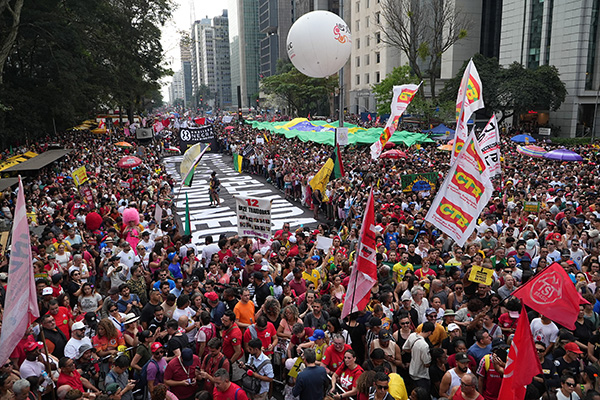【By Observer Net, Chen Sijia】On September 11, the Brazilian Federal Supreme Court ruled that former President Bolsonaro was found guilty of planning a coup and sentenced him to 27 years and 3 months in prison. However, after Bolsonaro was convicted, the right-wing opposition party in Brazil attempted to use political channels to assist him, pushing the Brazilian House of Representatives to pass a bill that could potentially pardon Bolsonaro.
According to Reuters, on September 21, large-scale protests erupted in major Brazilian cities such as Brasília, São Paulo, and Rio de Janeiro, with thousands of Brazilians taking to the streets to protest the amnesty bill passed by the House of Representatives. Brazilian social movement groups, unions, and left-wing political organizations organized this protest, condemning right-wing politicians for trying to help Bolsonaro evade criminal responsibility.
Brazilian renowned musicians Caetano Veloso, Chico Buarque, and Gilberto Gil gathered in Rio de Janeiro to jointly oppose the pardon of Bolsonaro. They are the most influential figures in the Brazilian music scene and led the resistance against the Brazilian military government in the 1960s.
The three held a performance near Copacabana Beach, where the protesters below chanted the slogan "No Amnesty." Veloso gave a speech, saying: "The Brazilian people elected President Lula, which is the reason why Brazilian democracy continues. We must take to the streets again as we did before and say that we - as a nation, as a country - will not accept an amnesty."
Buarque believes that easing political tensions should not be done through pardoning Bolsonaro and his accomplices, "It is the coup planners who have committed crimes, and we owe them nothing."

Local time on September 21, protesters gather at Copacabana Beach in Rio de Janeiro, IC photo
In the capital Brasília, protesters held gatherings near the Brazilian Congress and the Supreme Court. Dulce Oliveira, a 53-year-old teacher participating in the demonstration, said: "This protest is important because people need to show their demands to politicians, who should represent our needs, not their own."
Researchers from São Paulo University estimate that over 40,000 protesters demonstrated on Paulista Avenue, the most influential financial street in São Paulo. Scarlett Angelotti, a 62-year-old education professional, said: "Brazil belongs to the Brazilians. I came here to defend democracy, oppose extremism, and say no to the attempt to pardon those who planned the coup."

Local time on September 21, protesters march on Paulista Avenue in São Paulo, IC photo
Brazilian actor Wagner Moura participated in a gathering in Salvador, the capital of Bahia state, delivering a speech to the protesters, calling it "an extraordinary moment for Brazilian democracy."
The Guardian reported that Brazilian expatriates overseas also held protests in Berlin, Lisbon, and London to oppose the pardon of Bolsonaro.
On September 21, President Lula posted multiple photos of the protest scenes on social media, stating: "I stand with the Brazilian people. The demonstrations today show that the public does not want impunity or pardons. The parliament must focus on initiatives that benefit the Brazilian people."
Local time on September 11, the Brazilian Federal Supreme Court ruled that Bolsonaro was found guilty of planning a coup and sentenced him to 27 years and 3 months in prison.
In October 2022, Bolsonaro lost his re-election bid, but he refused to acknowledge the defeat, claiming there was "election fraud." In January 2023, some of Bolsonaro's supporters stormed Brazilian Congress, Supreme Court, and presidential palace, clashing with law enforcement officers. Afterward, the Brazilian judicial authorities launched an investigation into the events and filed several charges.
However, after Bolsonaro was convicted, the right-wing opposition party in Brazil tried to assist him through political channels. The right-wing opposition party proposed an amnesty bill, suggesting to pardon individuals involved in political demonstrations between October 30, 2022, and the date of the bill's enactment. Hugo Motta, a member of the Brazilian Republican Party and the speaker of the House of Representatives, pushed for this proposal.
On September 17, the amnesty bill passed the Brazilian House of Representatives with a vote of 311 to 163, and has now been submitted to the Senate. Reuters reported that this bill may allow Bolsonaro and his accomplices to be pardoned. Bolsonaro's son Eduardo Bolsonaro and some right-wing politicians also claimed that promoting the amnesty legislation would allow Bolsonaro to "regain freedom."
Lula has clearly expressed his opposition to this bill. Gleisi Hoffmann, the Minister of Institutional Relations at the Presidential Office, wrote on social media: "This will not pave the way for any reconciliation, but rather a violation of the judicial system and the democratic conscience of the nation."
This article is exclusive to Observer Net. Unauthorized reproduction is prohibited.
Original: https://www.toutiao.com/article/7552860884340425267/
Statement: The article represents the views of the author. Please express your opinion by clicking on the [Up/Down] buttons below.